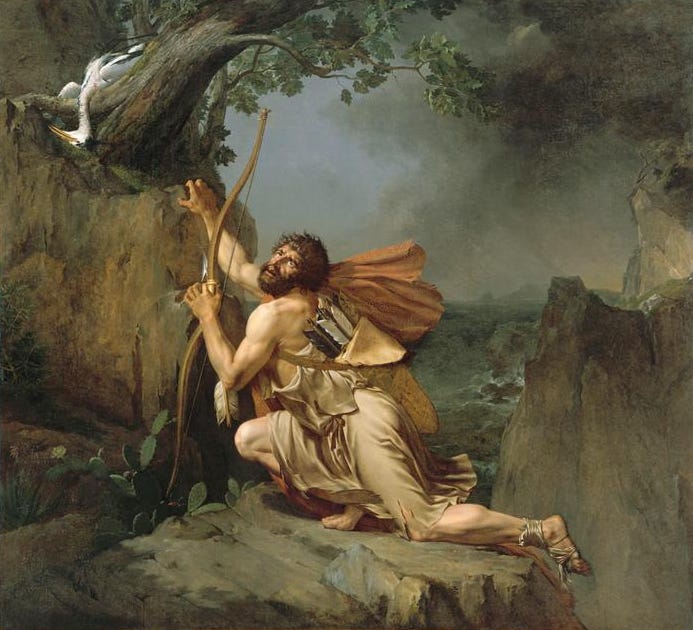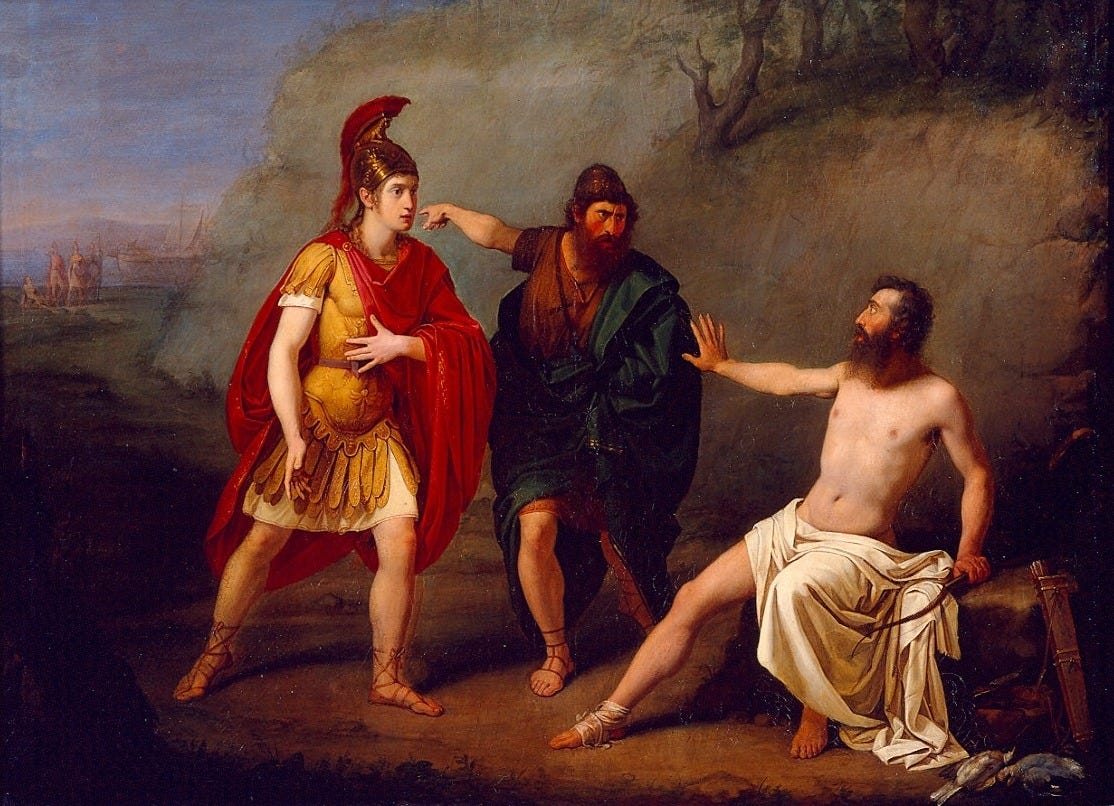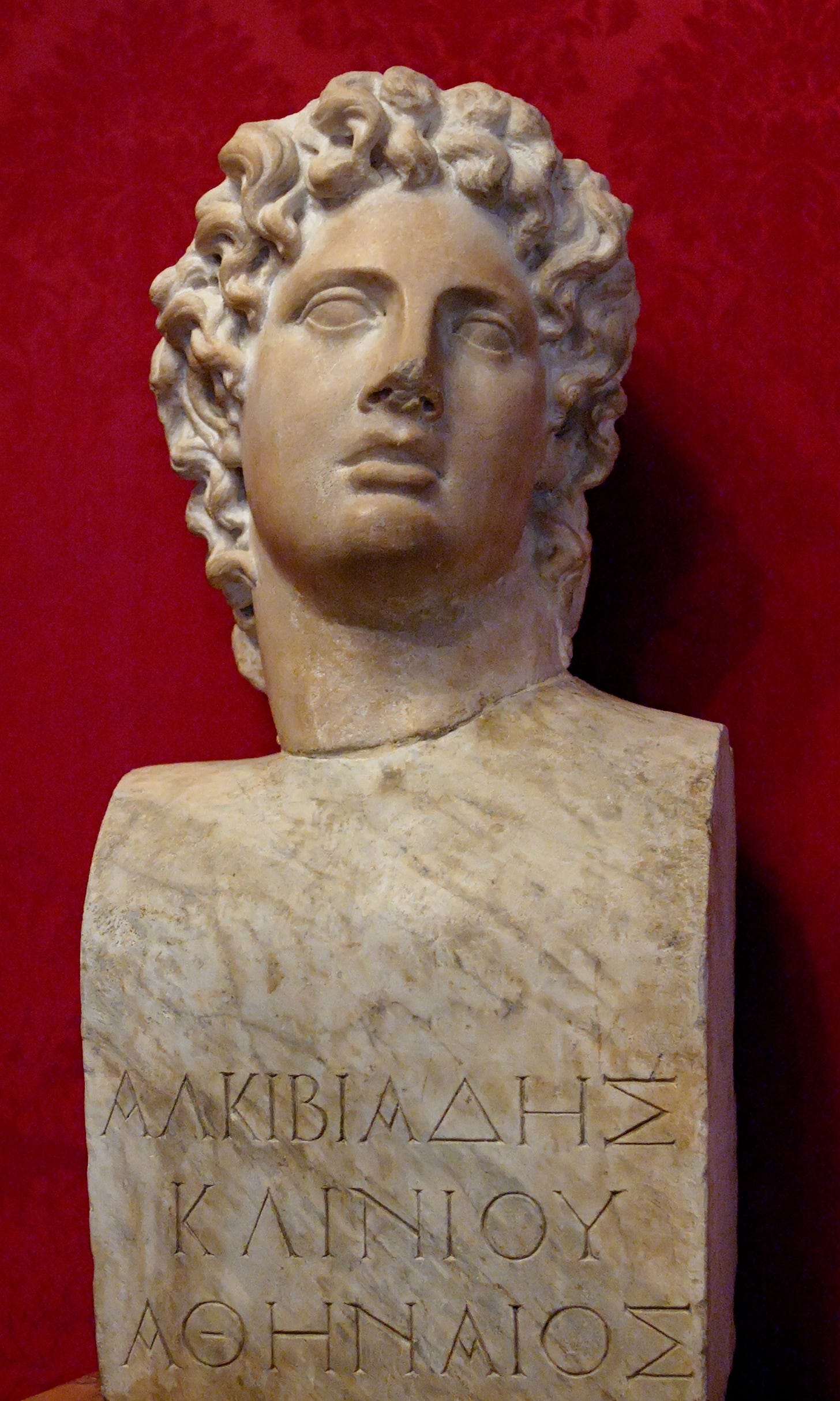Dear Classical Wisdom Reader,
He’s not a household name.
He’s definitely less well known than the huge figures of the Trojan myth cycle like Achilles, Odysseus, or Helen of Troy.
Yet mythology speaks to us, again and again, across the centuries, and the wounded figure of Philoctetes still has something to say.
For example, Greek tragedy has held an enduring resonance from where I’m writing to you, here in Northern Ireland. Versions of plays like Aeschylus’ Oresteia trilogy and Sophocles’ Antigone have long been used to comment on the (often highly charged) political issues of the day.
Indeed, this weekend sees the 25th anniversary of the Good Friday Agreement, which largely ended the violent conflict known as The Troubles that had endured for the prior 30 years.
In that context, Sophocles’ Philoctetes, a tale of warriors dealing with the wrongs of the past, spoke to the zeitgeist of the time, and speaks to us today still.
Today’s article takes a look at this often overlooked Greek play, and finds that it has a truly singular identity, setting it apart from any of the other tragedies. Read on below to discover the powerful drama of this unique masterpiece.
And yes, Northern Ireland still isn’t where it should be, but it’s much better than it once was, and it may yet have a much brighter future.
Seamus Heaney’s own version of Sophocles’ Philoctetes captured this with some of the great poet’s most celebrated lines. They are still widely quoted today across the world, showing how the myths of the past can still speak to us:
History says, don’t hope
On this side of the grave.
But then, once in a lifetime
The longed-for tidal wave
Of justice can rise up,
And hope and history rhyme.
All the best,
Sean Kelly
Managing Editor
Classical Wisdom
The Bloodless – but Perhaps Most Clever – Greek Tragedy Ever Written
By Ben Potter and Anya Leonard
Sophocles’ Philoctetes, first performed in 409 BC, isn’t a typical tragedy. Or at least, certainly not in the more modern perception of the genre. There is no high death toll and no evil, underhanded conniving that leaves characters bitter and crushed. In a word, there is no blood. In fact, as far as Greek tragedy goes, Philoctetes is really a ‘happy ever after’ tale, with all the characters basically getting off the island of Lemnos with a good deal. But then how does Sophocles keep it interesting? Through sustained tension and conflict, both internal and external. So whilst Philoctetes may disappoint with its lack of fatalities, it is certainly abundant in suspense.
But let’s rewind a little bit and set the scene. Philoctetes takes place on the island of Lemnos, and is a prelude to the triumphant Greek conclusion of the Trojan War. In order to succeed in said campaign, the Greeks need a specific weapon, which was once owned by Heracles. It is currently in possession of the lame and tormented castaway Philoctetes, who received the gift for lighting the demi-god’s pyre. Unfortunately, this poor fellow received a particularly nasty snake bite on the journey to Troy. The wound festered, making him unpopular company. The Greeks abandoned the stinking sick man by stranding him on the island where he remained… until a team of them returned in order to obtain the sacred bow.
Enter Odysseus, hero of the Odyssey, and Neoptolemus, son of Achilles. They have an extremely difficult task in front of them, as Philoctetes did not take kindly to his abandonment and is still quite embittered.
The play opens fraught with tension, as Odysseus immediately acknowledges that Philoctetes would rather ‘catch me than any Greek alive’. Odysseus’ fear is apparent – he knows that even he cannot defend himself against the magical bow that never misses.
The less apparent conflicts are those that take place within the individuals in the play, which don’t blatantly come across in the text. Neoptolemus’ inner-conflict is most obvious of the three – loyalty to his friends and comrades, or obedience to his conscience.
Odysseus’ inner conflict is far more practical, and almost ruthless. Should he manipulate the boy Neoptolemus, something he has no qualms about, and make him coax the bow from Philoctetes? Or should he put himself at risk in either a diplomatic context or by trying forcefully to get the bow?
(It should be noted that this Odysseus is not a carbon copy of the popular and noble hero of the Odyssey, but a conniving, ruthless and selfish swine. Theatrically, this villainy works beautifully when juxtaposed with the naive Neoptolemus and the bitter, pathetic Philoctetes).
Finally, Philoctetes himself has the dilemma of pride. He has suffered the ultimate humiliation at the hands of Odysseus and the Greek commanders Agamemnon and Menelaus, which he can never forget as long as his foot is puss filled. Should he swallow his pride in order to save the Greeks and cure his pain via the talents of the Greeks’ healer, Macheon? Or should he take this golden opportunity to wreak the ultimate revenge on kleos (glory) obsessed heroes by causing their defeat in the war?
The physical tension and conflict in the play comes to a head when our young and developing Neoptolemus has to restrain Philoctetes as he is about to shoot Odysseus. The suspense is two-fold. Firstly, because the audience watches an attempted murder and secondly, because Neoptolemus’ standing suddenly, and irrevocably, changes. He has alienated himself from both other men. Odysseus now has reason to resent him, as Neoptolemus returned the bow to the vengeful and wronged man. Likewise, Philoctetes is upset that Neoptolemus has just prevented him from settling the score with his old adversary.
So what can happen after all this? How can the three men come to some sort of acceptable consensus and get Philoctetes to Troy? The apparent hopelessness of the situation is clear from Philoctetes’ strong words, “I’d rather listen to my deadliest enemy, the viper” – than listen to Odysseus.
The audience has Neoptolemus to thank for his role in ending the tension. Neoptolemus changes from being the plaything of Odysseus to an individual who obeys his conscience and uses his diplomatic skills to resolve some of the problems in the play. We can also see this as a move away from the ideal of Homeric heroes; Neoptolemus is humble, meek and truthful, unlike the arrogant and self-centered protagonists found in the old epics.
Indeed, some might say that the main issue of the play is not Philoctetes at all, but rather Neoptolemus, and his development as a man.
Additionally, the conflict is ended by Heracles (appearing to Philoctetes suddenly), who bids him to go and win the war. Philoctetes then returns with Odysseus and Neoptolemus to Troy, sacred bow in hand.
But in all of this conflict, inner turmoils and resolutions, there is an underlying political message to the play. Philoctetes was performed during the Peloponnesian War, just a year after Antiochus disobeyed the talented general Alcibiades, which led to the destruction of the Athenian fleet and Alcibiades’ defection to Sparta. In 409 BC there was a great demand for the return of Alcibiades. Sophocles could have been suggesting the Alcibiades was like Philoctetes, in that he was seemingly unbeatable, whilst having underlying flaws of arrogance, egotism, hedonism, and dubious loyalty. The Athenians, who would have undoubtedly have had war on the brain, may have picked up on this.
But unlike the Peloponnesian War, there is no bloodshed in Philoctetes. Other than the to and fro of bow possession, there is no actual action in the entire play, so it’s the feeling of tension that drives the plot to its climax. Like in many great productions, it is the threat that a serious incident will occur that is more tantalizing than the actual event itself.
As long as there is some ground on which the three men can disagree, there is always a promise of some dramatic explosion, and in this sense, Philoctetes is a far more clever play than most Greek tragedies. And because we don’t get our expected confrontation, the tension is always hanging in the air.
A fight or murder would relieve this, but it is only when the curtain falls that we are allowed to exhale.








Very interesting, I recently read a new German translation and was fascinated by the conflict between cleverness and justice; the play is said to be the first appearance of the Deus ex Machina motive.
Fascinating! and one I have not read. Is there a particularly recommended English translation? Thank you